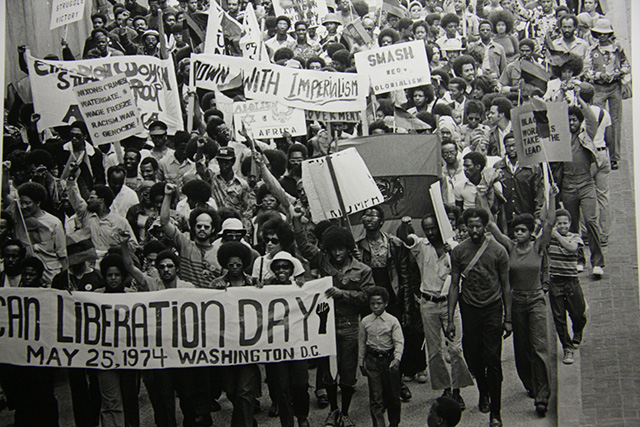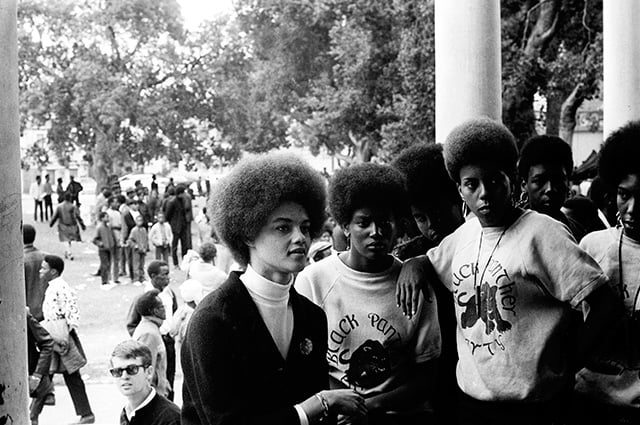
Did you know that Truthout is a nonprofit and independently funded by readers like you? If you value what we do, please support our work with a donation.
The following is an excerpt from Black Power 50, edited by Sylviane A. Diouf and Komozi Woodard. The book is an illustrated companion to a major exhibit at New York’s Schomburg Center for Research in Black Culture, a 50th-anniversary retrospective of Black Power in the United States and around the world:
1969. Algiers. The spectacular panorama of the first Pan-African Cultural Festival transformed the North African capital basking in the July sun. Musicians, dancers, horsemen, poets and painters, writers, filmmakers, scholars, and political leaders filled the city’s hotels. Southern African freedom fighters and veteran guerillas from Angola, Mozambique, and Guinea-Bissau at war with the Portuguese joined the colorful delegations arriving from all over the vast continent. Algeria, chosen by the Organization of African Unity to host the festival, insisted that liberation from colonial rule was as central to African unity as music. President Houari Boumediene, a military leader during their war for independence from France, said at the opening ceremony that “culture is a weapon in our struggle for liberation.” His words applied equally to the effervescent affirmation of black culture we were experiencing in the US where the black power movement fueled popular rejection of all varieties of racist control. African, Arab, European, and American visitors mingled with the invited artists and revolutionaries, including a delegation of Black Panthers, whom I was there to welcome. I’d just left my comrades that May in California, having barely escaped the dragnet pulling our leaders into prisons across the country.
 Kathleen Cleaver and fellow Black Panthers sporting Afros in Oakland, California, in a photo taken in 1968. (Photo: Stephen Shames)
Kathleen Cleaver and fellow Black Panthers sporting Afros in Oakland, California, in a photo taken in 1968. (Photo: Stephen Shames)
I’d met Eldridge Cleaver, the information minister of the Black Panther Party, at a student conference on black liberation held in Nashville over the Easter weekend of 1967. We fell in love and by Christmas we were married. In late November 1968, Eldridge fled imprisonment in the wake of a gun battle between Black Panthers and Oakland police, and by the time I set out to join him I was seven months pregnant. Determined to be with my husband when our first child was born, I headed off for Havana, but discovered en route that the place we would meet was Algiers instead. Half a year after his clandestine departure from the United States, Eldridge Cleaver, celebrated author of Soul on Ice and fugitive revolutionary, was enthusiastically welcomed to Algiers on the eve of the Pan-African Cultural Festival.
On July 17, every seat inside la Mutualité, the auditorium where his press conference took place, was filled. Students, revolutionaries, Arabs, Europeans, Africans, and Black Americans all applauded Eldridge’s arrival, acknowledging his presence in Algiers as a symbolic triumph over America’s racist power. I felt electricity surge through the crowd when I walked onto the stage with Eldridge and his interpreter who translated his words into French. The charisma and authority in his voice, added to his imposing physical presence, brought an unexpected element into the excitement generated by the upcoming festival. Being in Africa, for him and the entire movement he represented, held deep significance for our fight for black liberation within America.
The Black Panther Party admired and studied Africa’s struggles against colonialism, especially the Mau Mau rebellion in Kenya, Kwame Nkrumah’s rise to power in Ghana, and the Algerian victory over French imperialism, which were catalysts to our battle for self-determination and civil rights. When the powerful film The Battle of Algiers was shown in the US, black revolutionaries identified strongly with the urban guerrillas fighting for national liberation who are the central figures of the drama. Even more pervasive was the transformative impact of the book The Wretched of the Earth, the seminal work of the French-trained Caribbean psychiatrist Frantz Fanon. His revolutionary analysis of the Algerian war, to which he ultimately dedicated his life, revealed so many parallels between the experience of colonial domination in Algeria and the racial oppression blacks had suffered for centuries in America that it made his work the essential text of the black liberation movement. Thus, visiting Algiers became almost a kind of pilgrimage for black revolutionaries in 1969.
The opening ceremony at the cultural festival coincided with the worldwide broadcast of dramatic images from the US Apollo mission showing two men covered by silvery space suits plant an American flag on the moon. Journalists covering the first Pan-African Cultural Festival drawn to Eldridge Cleaver were filled with questions about this technological feat. Cleaver replied to the New York Times reporter, “I don’t see what benefit mankind will have from two astronauts landing on the moon while people are being murdered in Vietnam and suffering from hunger even in the United States.” His sentiments resonated among many, particularly the contingent of Afro-American artists and writers gathered in Algiers, which included jazz musician Nina Simone, playwright Ed Bullins, and the poet Don Lee, later known as Haki Madhubuti. Black revolutionary leader Stokely Carmichael, formerly chairman of the radical Student Nonviolent Coordinating Committee, was also present; he was at the festival accompanying his wife, the exiled South African singer Miriam Makeba, who was a featured performer. By 1969 our artists and revolutionaries all drew strength from the momentum of the mass movement for black freedom that was accelerating daily, and connecting our cultural and political expressions at the deepest levels.
Press freedom is under attack
As Trump cracks down on political speech, independent media is increasingly necessary.
Truthout produces reporting you won’t see in the mainstream: journalism from the frontlines of global conflict, interviews with grassroots movement leaders, high-quality legal analysis and more.
Our work is possible thanks to reader support. Help Truthout catalyze change and social justice — make a tax-deductible monthly or one-time donation today.